七年级英语下册Unit4Don’teatinclassPart5SectionB课后同步练习新版人教新目标版201806011112
七年级下英语Unit 4 Don't eat in class

Unit 4 Don’t eat in class一.单词短语1.wear a hat/uniform/watchIt’s rude to wear a hat in class.Wearing a hat in class will make the teacher really unhappy.二.语法祈使句三.句子1.Don’t arrive late for class. You must be on time.①We can’t arrive late for class. But Mike always arrives late for school.②Don’t forget to call me when you arrive in Xiangyang.What time does she arrive at school?My parents arrive home at 7:00 p.m.2.Don’t run in the hallways. Sorry, Ms. Clark.It’s dangerous to run in the hallways. You may(或许) hurt yourself or other students.3.Don’t eat in the classroom. You must eat in the dining hall.We can’t eat in the classroom, but we can eat outside or in the dining hall.4.Don’t listen to music in class.We must listen to the teacher in class. We can listen to a CD in the music room.Jenny often listens to mp4 on the school bus.5.Don’t fight.=No fighting.We can’t fight with our classmates. It’s wrong to fight with others.6.It’s my first day at school.It’s his first time to study in America.7.This is a great school, but there are a lot of rules.a lot of =lots of +不可数名词或者复数名词We have lots of homework on weekends, but we also have a lot of interesting things to do.8.Don’t be late for class. This is very important.①be late for…He gets up late, so he is often late for work.②“Be on time next time.” The teacher says to him, “This is very important”The teacher says it’s important to be on time.It’s important for the students to follow the school rules.English is an important subject.9.Can we bring music players to school?We can’t go out on school nights.①can用于一般疑问句中,表示询问是否许可或征求意见10.W e always have to wear the school uniform. And we also have to be quiet in the library. At my dream school, we don’t have to come to school every day.I must practice the guitar before dinner and then I have to do the dishes after dinner.I have to help my mother make breakfast every morning.I have to go to bed before 10:00.①have to…We don’t have to wear the school uniform on the weekend.She has to wear a uniform on school days.一般疑问句:Does she have to wear a uniform …? Yes, she does. /No, she doesn’t.变否定句:She doesn’t have to wear a uniform ….对划线部分提问:What does she have to do?②must We must eat in the dining hall.Must we eat in the dining hall? Yes, we must. /No, we don’t have to.(=needn’t情态动词) ●have to 必须, 还有因外界客观条件“迫不得已”之意,must 主观命令等We stay at home because it’s raining outside.As(作为) a student, we study/work hard.●mustn’t语气强硬,绝对禁止,多用于警告危险或原则性事件等We mustn’t swim in the river.③wearShe often wears a red T-shirt(a black watch).She looks beautiful in that white sweater.11.T here are too many rules.too many+ too much+ much too+We have too many rules at school.He has too much bread, so he is much too fat.12.D on’t leave the dirty dishes in the kitchen.①leave+宾语+宾补(介词短语,形容词等)Don’t leave your dirty clothes on the bed.Miss Hu often leaves her phone in the classroom. (区分forget)Don’t leave your homework at home.Leave me alone.②When does she leave Xiangyang for Shenzhen?13.A fter that, I run to school because I can’t be late.Lee gets up late, so he has to run to school.Sky is good at running.14.M y dad says I can’t play basketball after school because I must do my homework.15.A fter dinner, I can’t relax either. I must read a book before I can watch TV.You can watch TV after you read a book(=after reading a book).I can watch TV after doing my homework.She walks to school after(having/eating) breakfast.The boy goes to bed after brushing his teeth(=after he brushes his teeth).16.I know how you feel.①特殊疑问句做宾语从句用陈述语序Please tell me what you think of the book.I want to know how Tom goes to school.②I feel happy this weekend because I have no homework.She feels terrible because she has too much homework.17.t hink aboutLet’s think about the food.18.T here are a lot of things you can do. (定语从句,修饰前面的名词,看懂即可)Can you tell us the subject you like best?19.P arents and school are sometimes strict, but remember, they make rules to help us.①Sometimes, I walk to school.I often ride a bike to school. But sometimes I go to school by bus.②strict be strict with sb. in sth.My mother is very strict with me in my homework.A teacher must be strict with the students in their study. .③I can remember all the new words.Remember to bring your Chinese dictionary to school next week.Tom always remembers to finish his homework on time.④动词不定式表目的He gets to school early to clean the classroom.Lucy makes her bed every day to make her room tidy.20.W e have to follow them.It’s important for the students to follow the school rules.21.M olly must do her homework first when she gets home.get to+地点=arrive at/in+地点When do you get to school(=arrive at school)? What time does she get/arrive home? 22.G ood luck(to you). Wish you good luck.She is lucky to have so many friendly/nice/good friends.23.I must/have to keep my hair short.①keep+adj. 保持某种状态My mother exercises every day to keep healthy.keep+宾语+宾补“使…保持某种状态”We should keep our bedroom tidy and clean.②She is a nice girl with long black hair. She looks beautiful with brown hair.24.I can’t relax on weekends either because I have to learn to play the piano.I want to learn how to ride a bike. Can you teach me how to ride a bike?25.I listen to him because I don’t want the cat to get me.①listen to sb. ①听某人说活②听从某人Tom’s mother asks him not to watch TV, but he doesn’t listen to her.②want sb. to do sth. 想要某人做某事26.I think it’s best to follow the rules.It’s best to do sth…最好做某事It’s best to finish your homework first.。
七年级下册英语unit4--Don't-eat-in-class

School Rules
Don’t fight.
Don’t listen to music in the classrooms or the hallways.
Don’t run in the hallways. Don’t arrive late for class.
1a
Write the number of the rule next to the students.
What do you say to him?
Don’t run in the hallways.
2a: Listen. Check( ) the activities Alex and Cindy
talk about .
Activity 1._____ listen to music in the classrooms or hallways. 2._____eat in the classrooms 3._____wear a hat 4._____listen to music outside 5._____fight 6._____listen to music in the music room 7._____ eat in the dinning hall 8._____eat outside can can’t can can can can can can can can’t can’t can’t can’t can’t can’t can’t
2019-2020年人教版英语七年级下册Unit4Don’teatinclass单元
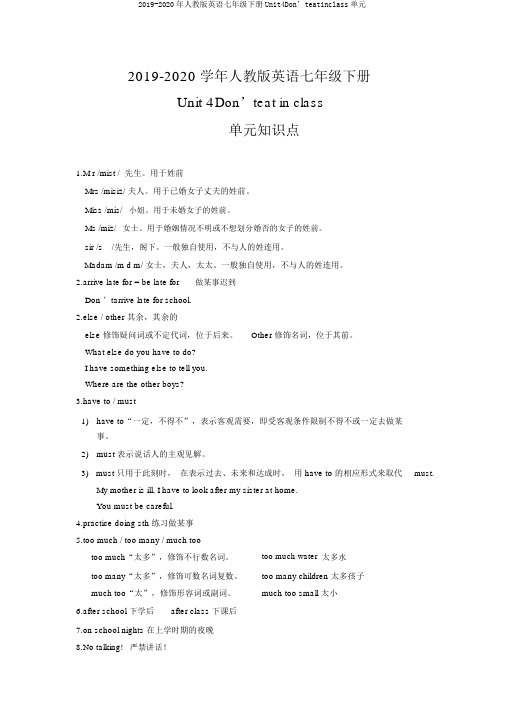
2019-2020 学年人教版英语七年级下册Unit 4Don’teat in class单元知识点1.M r /mist / 先生。
用于姓前Mrs /misiz/ 夫人。
用于已婚女子丈夫的姓前。
Miss /mis/小姐。
用于未婚女子的姓前。
Ms /miz/女士。
用于婚姻情况不明或不想划分婚否的女子的姓前。
sir /s /先生,阁下。
一般独自使用,不与人的姓连用。
Madam /m d m/ 女士,夫人,太太。
一般独自使用,不与人的姓连用。
2.arrive late for = be late for做某事迟到Don ’tarrive late for school.2.else / other 其余,其余的else 修饰疑问词或不定代词,位于后来。
Other 修饰名词,位于其前。
What else do you have to do?I have something else to tell you.Where are the other boys?3.have to / must1)have to“一定,不得不”,表示客观需要,即受客观条件限制不得不或一定去做某事。
2)must 表示说话人的主观见解。
3) must 只用于此刻时,在表示过去、未来和达成时,用 have to 的相应形式来取代must.My mother is ill, I have to look after my sister at home.You must be careful.4.practice doing sth 练习做某事5.too much / too many / much tootoo much“太多”,修饰不行数名词。
too much water 太多水too many“太多”,修饰可数名词复数。
much too“太”,修饰形容词或副词。
6.after school 下学后after class 下课后too many children 太多孩子much too small 太小7.on school nights 在上学时期的夜晚8.No talking!严禁讲话!No+ 名或名,表示严禁、不要做某事。
七年级英语下册unit4don’teatinclass(第5课时)

too many rules------get up and make your bed------leave the dishes------be late------be noisy------must do my homework------relax-----read a book------
Step 5 Post-reading activities
Task1: Read 2b aloud.
Then have some of them read it in front of the class. Task 2:Retell the article according to the following key
2.晚饭后,我也不能放松。 3. 读完书后,你可以打篮球。
____________________________________________
strict 是形容词,be strict with sb. 意为“_______________”; be strict in sth.意为“_______________”。
如:1.我父母对我要求严格。
My parents ________ ______ ______ me.
2. Molly _gets home.
3. Molly __________ read a book after dinner before she ______ watch TV.
4. At school, Molly _____ be noisy or eat in class.
________ 修饰不可数名词,_________ 修饰可数名词。
1.屋子里烟太多。There is _____ _____ smoke in the room. 2.动物园中人太多。 There are ____ _____ people in the zoo.
人教版英语七年级下册Unit4Don’teatinclass.知识点及课后作业
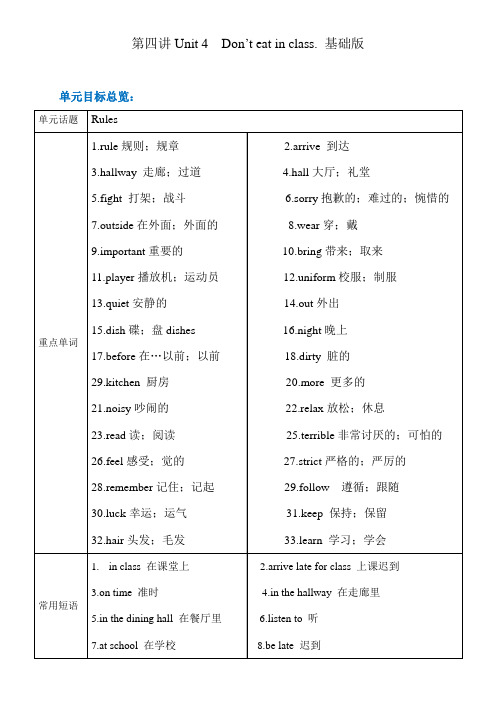
第四讲Unit 4 Don’t eat in class. 基础版单元目标总览:【知识点详解】1、Don’t arrive late for class.上课不要迟到。
1)arrive 意为“到达”。
arrive at+小地点,arrive in +大地点。
◆I will arrive in Beijing next week. 我下周到北京。
◆I arrived at the small village on a cold morning. 在一个寒冷的早晨我到达了那个小村庄。
2)arrive 后面跟地点副词here, there, home时,不需要跟介词。
◆arrive home 到家arrive here 到这儿2、You must be on time.你必须准时。
(1)on time&in timeon time 意为“按时,准时”,指按照规定的时间或者指定的时间做某事;而in time指“及时”,指不迟到或在规定的时间之前或者接近所规定的时间做某事。
◆We must arrive there on time. 我们必须按时到达那里。
At last, the police arrived there in time. 最后警察及时赶到了那里。
(2)must情态动词,意为“必须”,不能单独做谓语,必须和动词原形以其构成谓语;其后接动词原形;其否定形式mustn’t意为“禁止,千万不要”◆I must do my homework before dinner.晚饭前我必须做完作业。
3、Don’t listen to music in class.不要再课堂上听音乐。
(1)listen 是不及物动词,意为“听,倾听”,强调听的动作,后面接宾语时要加上介词to。
◆We should listen to the teacher carefully. 我们应该认真听老师讲课。
◆Listen! Someone is singing in the garden. 听! 有人在花园里唱歌。
七年级英语下册-Unit-4-Don‘t-eat-in-class教案-(新版)人教新目标版

Unit 12 Don’t eat in class.I.教学设计分析本单元的中心话题是rules,主要语言功能是谈论并制定某些规章制度,如校规、班规和家规。
语言结构为祈使句。
利用情态动词can, must, have to 来谈论一些规章制度。
在Section A里通过活动与图片的配对,引出本部分中关于“学校的规章制度”及否定祈使句。
主要训练学生的听、说、演及其归纳总结的水平。
Section B主要通过一系列的句式进一步训练目标语言,并注意have to与 must, can与can’t的用法。
最后是要能使用所学的知识去制定一定的规则。
New languages:1.- Don’t run in the hallways. Don’t fight.2.-What are the rules? We must be on time for class.3.-Can we eat in the classroom?-No, we can’t, but we can eat in the dining hall.4.-Can we wear a hat in class? Yes, we can./ No, we can’t.5. - Does he have to wear a uniform at school?-Yes, he does. / No, he doesn’t.6. What do you have to do? We have to be quiet in the library.II. 教学学时分配Teaching periods:Period 1: Section A 1a -1cPeriod 2: Section A 2a -2cPeriod 3: Grammar Focus/ 3a -3cPeriod 4: Section B 1b -1fPeriod 5: Section B 2a-3c and self checkPeriod 6: Review Unit 1Unit 4 Don’t eat in class.Section A (1a-1c)1.Master the key words:rules, hallway, classroom, Mrs. fight, school rules.Master the sentences: 1). Don’t eat in class.2).You must be on time.3). Eat in the dining hall.2.Talk about the school rules.3.Listening and speaking skills and communicative competence.4. Encourage students to talk about the rules.5. To help Ss use the target language in natural speech.II. Key points1. Talk about the school rules and the target language.2. Learn to talk about the school rules.3. Imperatives Don’t...Difficult point:1. Talk about the school rules and the target language.2. Learn to talk about the school rules.III. Teaching aidsMultimedia/A tape recorder/A blackboardIV. Teaching proceduresStep1 Leading-inWarming-upT:What’s the woman doing? S: Sh e’s eating.T: Where is she eating? S: Sh e’s eating in class.T:Can you eat in class? S: No, we can’t.T: So please don’t eat in class.(= You can’t eat in class.)…Step 2 Presention1. T: Now, Look at the picture on your textbook. Each of the students is breaking one ofthese rules.Please finish 1a.1. Don’t arrive late for class. You must be on time.2. Don’t run in the hallways.3. Don’t eat in the classroom. You must eat in the dining hall.4. Don’t listen to music in class.5. Don’t fight.2. Listening1). T: Now let’s listen! What rules are these students breaking? Write the numbers after names?Peter ______ Amy ______ Mike ______2). Check the answers:3). Listen again and complete the conversation.Ms. Clark: Hey, Peter. You know the rules. Don’t _________________.Peter: Sorry, Ms. Clark.Mr. Smith: Amy, don’t _______________________.Amy: Oh, sorry, Mr. Smith.Mr. Smit h: Hey, Mike, don’t ______________ in class. Mike!Boy: He can’t hear you, Mr. Smith.Step3 ConsolidationPair workS.A is a new student. S.B is telling S.A about the school rules.Ask students to practice the conversation and make their own conversations.Ss work in pairs and practice saying the school rules.A: What are the rules?B: Well, we can’t arrive late for class. We must be on time.…Step 4 Summary1. Words: rules, arrive, late, hall, dinning hall, listen, listen to, fight, sorry Phrases: on time listen to… arrive/be late forSentences: 1. Don’t arrive late for class.You must be on time.2. Don’t run in the hallways.3. Don’t eat in the classroom. You must eat in the dining hall.4. Don’t listen to music in class.5. Don’t fight.2. Assign homework:1). Copy the new words (5E, 1C).2). Try to remember the words and expressions and use them freely.3). Write the rules in your school with“Don’t …. We can’t.... We must...”. V. Blackboard designUnit 4 Don’t eat in class.Section A1. Don’t arrive late for class.You must be on time.2. Don’t run in the hallways.3. Don’t eat in the classroom. You must eat in the d ining hall.4. Don’t listen to music in cla ss.5. Don’t fight.Teaching reflection:。
洛阳市七年级英语下册Unit4Don'teatinclass必考知识点归纳

洛阳市七年级英语下册Unit4Don'teatinclass必考知识点归纳单选题1、Do you usually go to school ________ bus or ________ foot?A.by; byB.on; byC.by; onD.on; in答案:C句意:你通常乘坐公交车还是步行去上学?考查介词。
by乘坐某种交通工具,中间没有冠词;in在……里面,后跟交通工具时,交通工具前要加冠词;on 在……上面,后跟交通工具时,交通工具前要加冠词;所以第一空应用by,构成短语by bus“乘坐公共汽车”;第二空是on foot“步行”,是固定短语,故选C。
2、I can't find my keys.Maybe I them at home this morning.A.leftB.forgotC.lostD.missed答案:A句意:我找不到钥匙了。
也许我今天早上把它们落在家里了。
考查动词辨析。
A. 离开/遗留;B. 忘记;C. 丢失,失去;D. 错过。
at home在家里;根据上文I can't find my keys 可知猜测落在家里了,leave符合句意,故选A。
3、—_____________ dressed now! We have to go in ten minutes.—OK, Mom.A.GettingB.GetC.To getD.Gets答案:B句意:——现在就穿上衣服!十分钟之后我们必须走。
——好的,妈妈。
考查祈使句。
空格所在句为祈使句,祈使句以动词原形开头。
根据句意结构,可知选B。
4、He usually _________ home _________ work.A.go; beforeB.goes; whenC.goes; afterD.go; after答案:C句意:他通常下班后回家。
考查主谓一致及介词辨析。
before在……之前;after在……之后;when当……时候。
九江市八中七年级英语下册Unit4Don’teatinclassPeriod5SectionB3a_

Unit 4 Don’t eat in class.Period 5 Section B 3a-Self Check【课型】练习课学习目标1.学生能口笔头掌握本课重点词汇:keep,hair,learn...复习梳理以下有关规则的句型:I have to.../I must.../I can’t.../Don’t...2.通过学习,学生能熟练运用目标知识讨论班规和家规,能够熟练运用祈使句描述规则。
能以书信的形式写出自己的班规或家规。
3.通过学习增强学生遵守班规校规的自觉性。
学习过程【自主学习】请在课前写一写你的家规或校规。
参考句型:I have to.../I must.../I can’t.../Don’t...【新课导入】Step 1:Lead-inFree talk任务一:Let’s review the rules in your family!参考句型:I have to.../I must.../I can’t.../Don’t...任务二:观察幻灯片上老师所给的图片,复习以下关于规则的句型。
Don’t be noisy.Don’t leave th e dirty dishes in the kitchen.Do your homework after school.Practice the guitar every day.Don’t watch TV after school.T:Do you think the rules in your family are right?Why or why not?(你认为这些家庭规则合理吗,为什么,说说你的理由。
)______________________________________________________________________【新知呈现】Step 2:Presentation任务一:Complete Zhao Pei’s letter to Dr.Know using have to/must,can or can’t.(阅读3a,用have to/must,can/can’进行填空)任务二:根据课文,回答问题1.Is Zhao Pei happy?Why or why not?________________________________________________________________________2.When does she have to get up every morning?________________________________________________________________________3.Can she play with her friends after school?Why?________________________________________________________________________4.Can she watch TV on school nights?________________________________________________________________________5.What does she have to do on weekends?________________________________________________________________________6.Does she have any fun?________________________________________________________________________ 【新知学习】Step 3:Reading activity课堂探究一任务一:Can you list the rules of Zhao Pei’s family and school?(你能罗列出Zhao Pei家里和学校的规则吗?)1.2.3.4.5.6.任务二:T:If you are Zhao Pei,will you be happy?Why or why not?(如果你是Zhao Pei,你会开心吗,为什么?)课堂探究二Complete the chart with the rules in your home and school.Put an × for the课堂探究三Writing Task语言提示:I have to... I must... I can’t...Don’t...Dear Dr.Know,There are too many rules in my life!________________________________________________________________________ ________________________________________________________________________ ________________________________________________________________________ ________________________________________________________________________ 课堂探究四Read and translate the given phrases.(读并且翻译这些词组。
七年级英语下册Unit4Don’teatinclass复习素材人教新目标版(2021年整理)

陕西省延安市富县羊泉镇七年级英语下册Unit 4 Don’t eat in class复习素材(新版)人教新目标版编辑整理:尊敬的读者朋友们:这里是精品文档编辑中心,本文档内容是由我和我的同事精心编辑整理后发布的,发布之前我们对文中内容进行仔细校对,但是难免会有疏漏的地方,但是任然希望(陕西省延安市富县羊泉镇七年级英语下册Unit 4 Don’t eat in class复习素材(新版)人教新目标版)的内容能够给您的工作和学习带来便利。
同时也真诚的希望收到您的建议和反馈,这将是我们进步的源泉,前进的动力。
本文可编辑可修改,如果觉得对您有帮助请收藏以便随时查阅,最后祝您生活愉快业绩进步,以下为陕西省延安市富县羊泉镇七年级英语下册Unit 4 Don’t eat in class复习素材(新版)人教新目标版的全部内容。
Unit 4 Don't eat in class。
1.祈使句的构成和用法概念:祈使句是用来表示请求、命令、叮嘱、邀请、劝告等的句子。
结构:祈使句一般以动词原形开头, 句末用句号或感叹号。
a) Do 型祈使句肯定结构:动词原形+宾语+其它否定结构: Don’t+动词原形+宾语 Open the door.开门 Don’t play soccer in the classroom.不要在教室里踢足球。
b) Be 型祈使句肯定结构: Be+表语否定结构: Don’t+be+表语 Be careful next time!下次要细心! Don’t be late for school.上学不要迟到。
c) Let 型祈使句肯定结构: Let+宾语+动词原形+其它否定结构: Don’t+let+宾语+动词原形+其它Let’s not+动词原形+其它 Let’s go home.我们回家吧。
d) No 型祈使句结构: No+动词 ing 或 No+名词。
这种结构的祈使句一般用来表示禁止。
No talking 禁止讲话(=Don't talk=Stop talking)No photos 禁止拍照(=Don’t take photos)2.短语:1.go out 外出(娱乐) You can't go out on school nights。
人教版七年级下册英语Unit4Don’teatinclass.

初中英语学习资料madeofjingetiejiUnit4 Don’t eat in class.Section A一、依据旬意及首字母提示达成单词。
1.We must obey(恪守 )the school r.2.Don’t f.You should help each other.3. It s’raining o.We have to stay at home.4.Don’ at late for class.5.Do you have to w uniforms at school?6.We can eat in the d hall.7.We have to be q in the library .8.Can I b my music player to school?9.He(not have)to go now.10.(not be)late for class, Mary.二、用括号内所给单词的适合形式填空。
1.(be)quiet,Tom.2.Don’t (eat)in the classroom.3.She must (arrive)on time for class.4.Don’ t fight with your classmates.That makes the teachers (happy).5.Don’ t bring your music (play)to schoo1.6.This is my (one)day at school.7.We always have (wear)uniforms at school.8. It takes about 10 minutes (get)to school.9.He about 5 (kilometer)from my home to school.10. We must (be)on time for school.三、英汉互译。
初中英语《Unit4Don’teatinclass》单元教学设计以及思维导图

Unit 4 Don’t eat in class适用年级七年级所需时间课内共用4课时主题单元学习概述本主题单元的标题是“Don’teat in class.”,是人教版七年级下册第四单元,内容与学生学校生活相关,符合七年级学生的年龄特点和心理特点,他们有深刻的生活体验,易于接受。
本单元的中心话题是rules,主要语言功能项目是谈论并制定某些规章制度(校规、班规、家规等)。
语言结构为祈使句,情态动词can 表示许可的用法和情态动词must,have to以及各种句式的变化。
围绕这一中心话题,结合学生生活实际,教材插入了许多学生感兴趣的图片,从基本语言知识到语言综合运用层层递进,听、说、读、写依次展开,引导学生思考、学习和运用语言,并寓教于学,对学生起到规范教育作用。
谈论规章制度这个话题在英语中表现出较强的语体差异——书面语及口语、正式及非正式场合中语言的使用不完全相同。
具体说,书面语及命令式的正式口语中人们多使用祈使句,而大多数口语交流中,人们则有意回避祈使句结构,较多地使用相应的情态动词。
这一点,英语和汉语的语言文化有很大差异。
英语语言中,不合时宜或生硬地使用祈使句,即便不被视为没有礼貌或缺乏教养,也回被认为不够友善。
因此通过这单元的学习,学生还将学会如何得体地使用祈使句和情态动词来谈论规章制度。
本单元的学习重、难点:重点掌握祈使语气的用法,包括表示允许的Can及其当情态动词用的haveto do;以及各种可以用在表述规章制度的动词和句型。
难点在于情态动词的用法,以及祈使句与它的应答。
依据语言学习“感知、体会、理解、运用”的认知规律,将本单元的学习划分为两个专题。
专题一:学会得体地使用祈使句和情态动词来谈论学校规章制度。
专题二:如何运用所学与他人谈论其他规章制度,如家规,公共场合的规章制度等。
专题三是研究性学习专题,在以上两个专题学习的基础上,了解中外相同或不同的校规、班规及家规,了解西方孩子有烦恼时,更愿意向专业人士或机构求助。
七年级英语下册Unit4Don'teatinclass
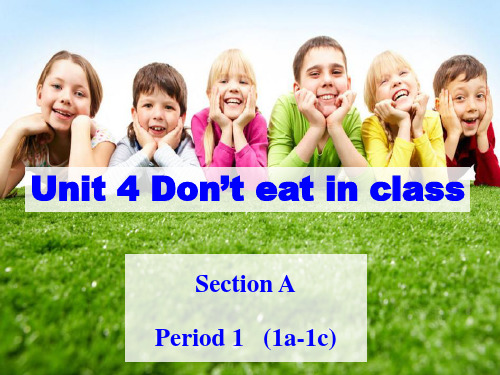
祈使句 1. 用法:一般以动词原形开头,表示请求、命令、劝说、 警告等。在祈使句中,通常省略句子主语第二人称you。
2. 句子结构 (1) 肯定句:_动__词__原__形___+ 其他
在餐厅里吃东西。
_E_a_t__in__th_e__d_i_n_in_g__h_a_ll_._____________ 在音乐教室里听音乐。
A: Can we eat in the classroom?
B: No, we can’t. We can’t eat in the classroom.
Don’t eat in the classroom.
A: Can we eat in the dining hall(餐厅)? B: Yes, we can eat in the dining hall.
Eat in the dining hall
A: Can we run in the hallways(走廊、 过道)?
B: No, we can’t. We can’t run in the hallways.
.
Don’t run in the hallways.
A: Can we listen to(听) music in class?
What are the rules?
Well, we can’t run in the hallways.
What are the rules?
Well, we can’t eat in the classroom. We must eat in the
dining hall.
What are the rules?
2. arrive late for class __上__课__迟__到_______ 4. in the hallways ____在_走__廊__里_____
初中英语《unit4don’teatinclass》单元教学设计以及思维导图
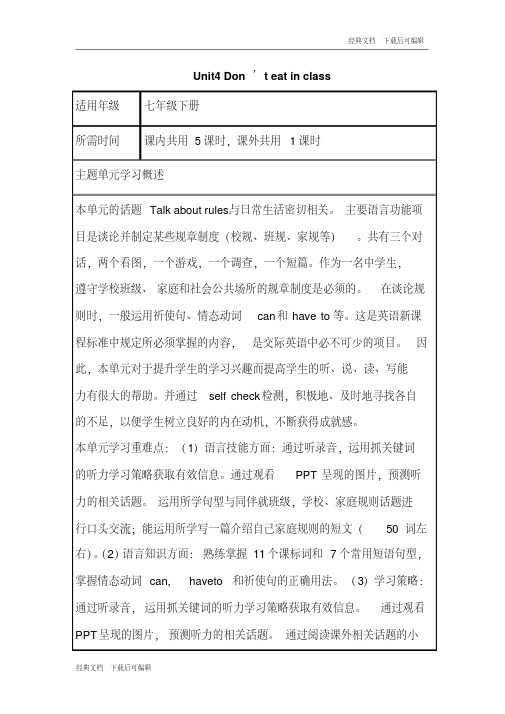
Unit4 Don’t eat in class适用年级七年级下册所需时间课内共用5课时,课外共用1课时主题单元学习概述本单元的话题Talk about rules.与日常生活密切相关。
主要语言功能项目是谈论并制定某些规章制度(校规、班规、家规等)。
共有三个对话,两个看图,一个游戏,一个调查,一个短篇。
作为一名中学生,遵守学校班级、家庭和社会公共场所的规章制度是必须的。
在谈论规则时,一般运用祈使句、情态动词can和have to等。
这是英语新课程标准中规定所必须掌握的内容,是交际英语中必不可少的项目。
因此,本单元对于提升学生的学习兴趣而提高学生的听、说、读、写能力有很大的帮助。
并通过self check检测,积极地、及时地寻找各自的不足,以便学生树立良好的内在动机,不断获得成就感。
本单元学习重难点:(1)语言技能方面:通过听录音,运用抓关键词的听力学习策略获取有效信息。
通过观看PPT呈现的图片,预测听力的相关话题。
运用所学句型与同伴就班级,学校、家庭规则话题进行口头交流;能运用所学写一篇介绍自己家庭规则的短文(50词左右)。
(2)语言知识方面:熟练掌握11个课标词和7个常用短语句型,掌握情态动词can,haveto和祈使句的正确用法。
(3)学习策略:通过听录音,运用抓关键词的听力学习策略获取有效信息。
通过观看PPT呈现的图片,预测听力的相关话题。
通过阅读课外相关话题的小短文,拓展视野。
本单元可划分为两个专题,专题一:认识并遵守班级、学校及家庭规则。
专题二:用英语熟练表达学校、家庭及其他公共场合规则并发表自己的观点。
两者是递进的关系。
前者是后者的基础,后者是前者的升华,最终达成对学生综合语言运用能力的培养目标,学会用英语做事情。
本单元主要采用的学习方式是在情景中学习、听读中输入、说写中输出、自主学习与小组合作学习相结合。
本单元的预期学习成果:1. 听力任务完成后,学生能正确理解主要功能句的意义,模仿录音进行分角色朗读,并仿编对话。
人教版新目标英语七年级下册《Unit4Don’teatinclass》公开课说课稿

人教版新目标英语七年级下册《Unit 4 Don’t eat in class》公开课说课稿一. 教材分析人教版新目标英语七年级下册《Unit 4 Don’t eat in class》是一篇关于学校规则和纪律的阅读文章。
本课的主题是让学生了解和遵守学校的规章制度,培养学生的良好行为习惯。
教材通过描述一个教室里的场景,让学生学会用英语表达不允许在课堂上吃东西的规定。
本课的主要语言点包括情态动词“Don’t” 的使用,以及与学校相关的词汇和表达方式。
二. 学情分析七年级的学生已经掌握了基本的英语语法和词汇,具备一定的阅读理解能力。
他们对学校的规定和纪律有一定的了解,但可能对如何用英语表达这些规定和纪律还不够熟悉。
此外,学生可能对一些与学校相关的词汇和表达方式还不够熟悉,需要通过教学进行补充和巩固。
三. 说教学目标1.知识目标:学生能够掌握情态动词“Don’t” 的使用,学会用英语表达学校的规定和纪律。
2.能力目标:学生能够通过阅读理解文章,运用所学知识描述和解释学校的规定和纪律。
3.情感目标:学生能够认识到遵守学校规定的重要性,培养良好的行为习惯。
四. 说教学重难点1.重点:学生能够掌握情态动词“Don’t” 的使用,学会用英语表达学校的规定和纪律。
2.难点:学生能够正确运用情态动词“Don’t” 描述不允许的行为,并能够用英语解释学校的规定和纪律。
五. 说教学方法与手段1.教学方法:采用任务型教学法,让学生在实际情境中运用所学知识。
2.教学手段:利用多媒体课件和实物教具,帮助学生更好地理解和记忆课文内容。
六. 说教学过程1.导入:通过提问学生对学校规定的了解,引出本课的主题。
2.阅读理解:学生阅读课文,回答相关问题,理解课文内容。
3.新课呈现:教师通过实物教具和多媒体课件,介绍情态动词“Don’t”的使用,以及与学校相关的词汇和表达方式。
4.课堂活动:学生分组讨论,用英语描述学校的规定和纪律。
5.练习巩固:学生完成相关练习题,巩固所学知识。
七年级英语下册Unit4Don’teatinclass要点详解素材3新版人教新目标版
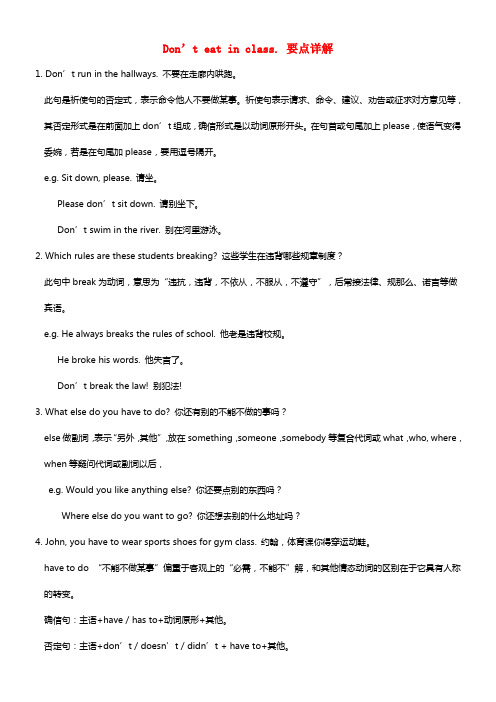
Don’t eat in class. 要点详解1. Don’t run in the hallways. 不要在走廊内哄跑。
此句是祈使句的否定式,表示命令他人不要做某事。
祈使句表示请求、命令、建议、劝告或征求对方意见等,其否定形式是在前面加上don’t组成,确信形式是以动词原形开头。
在句首或句尾加上please,使语气变得委婉,若是在句尾加please,要用逗号隔开。
e.g. Sit down, please. 请坐。
Please don’t sit down. 请别坐下。
Don’t swim in the river. 别在河里游泳。
2. Which rules are these students breaking? 这些学生在违背哪些规章制度?此句中break为动词,意思为“违抗,违背,不依从,不服从,不遵守”,后常接法律、规那么、诺言等做宾语。
e.g. He always breaks the rules of school. 他老是违背校规。
He broke his words. 他失言了。
Don’t break the law! 别犯法!3. What else do you have to do? 你还有别的不能不做的事吗?else做副词,表示“另外,其他”,放在something,someone,somebody等复合代词或what,who, where,when等疑问代词或副词以后,e.g. Would you like anything else? 你还要点别的东西吗?Where else do you want to go? 你还想去别的什么地址吗?4. John, you have to wear sports shoes for gym class. 约翰,体育课你得穿运动鞋。
have to do “不能不做某事”偏重于客观上的“必需,不能不”解,和其他情态动词的区别在于它具有人称的转变。
英语七年级下册unit4don27teatinclass复习要点

unit 4 Don’t eat in class.单词规则规章,到达大厅礼堂听,打架,抱歉,在外面,穿戴,重要的,安静的,练习,碟,盘在----以前,以前,脏的,厨房,更多的,吵闹的,阅读,非常讨厌,感受,记住,幸运,保持,头发学习短语:1. in class 在课上 in the classroom 在教室里2. arrive late for class = be late for class 上课迟到arrive in + 大地方arrive at + 小地方3. (be) on time 准时4. fight with sb. 和某人打架5. must + 动词原形必须做某事= have to do sth. 不得不做某事6. bring…to…把…带到…来Bring your book to school (me).7. eat outside 在外面吃饭 wear a uniform 穿制服 wear glasses 戴眼镜8. practice the guitar 练习吉它 practice playing the guitar 练习弹吉他9. on school nights在上学的晚上on school days在上学的日子10. too many + 可数名词复数too much + 不可数名词表示太多…11. make one’s bed 铺床make breakfast 做早饭make friends 交朋友12. help sb. do sth. help sb. with sth. help sb. with doing sth肯定句中表示“也”。
either 否定句中表示“也”I can play chess. She can, can’t, either.about = think of 考虑、认为如:How do you think about this sweater 你觉得这件毛衣怎样15.make rules 制定规则 follow the rules 遵守规则break the rules 违反规则用法16. keep (+名词或代词)+形容词,表示保持某物怎么样keep quiet 保持安静keep your hair short保持头发短keep your room clean 保持房间干净17.learn sth. 学习某事learn English learn the guitar , learn to do sth.学习做某事learn to speak English / learn to swim18. be strict (with sb.) 对某人严格My mom is strict with me.19. remember 记住,常用短语有:(1)remember sth./sb. 记住某物、某事、某人Please remember this sentence. 请记住这个句子。
- 1、下载文档前请自行甄别文档内容的完整性,平台不提供额外的编辑、内容补充、找答案等附加服务。
- 2、"仅部分预览"的文档,不可在线预览部分如存在完整性等问题,可反馈申请退款(可完整预览的文档不适用该条件!)。
- 3、如文档侵犯您的权益,请联系客服反馈,我们会尽快为您处理(人工客服工作时间:9:00-18:30)。
Unit 4 Don’t eat in classPart 5 Section B(课后)——理解运用,提升思维一、善用语境,学会猜词。
根据语境选择画线单词的意思,并圈出能帮助你选择的关键词。
( C )1.I find saving money is difficult because I always like shopping.A.借钱B.还钱C.存钱D.还钱( A )2.I overslept this morning so I was late for class.A.睡过头B.熬夜C.早起D.睡不着( C )3.Mr Black has a lot of money at West Bank. He is the VIP customer at the bank.A.学员B.运动员C.顾客D.游客( D )4.Mrs Li is worrying about her son’s health. The worry aged her quickly.A.年龄B.超龄C.减龄D.催老( B )5.Forget the doldrums and get back to living a happy healthy life.A.正面情绪B.负面情绪C.开心的时光D.幸福生活二、Section B—2b课文重点句型过关。
1.不要在走廊上听音乐。
Don’t listen to music in the hallways.2.你们必须按时到校。
You must get to school on time.3.我们总是要穿校服上学。
We always have to wear school uniforms at school.4.我必须要做我的作业。
I must do my homework.5.你可以在周末做些什么?What can you do on weekends?三、Section B语法过关。
( A )1.__________ get off the bus before it stops.A.Don’t B.Doesn’t C.Didn’tD.Can’t( D )2._________ you dance? We need some more actors for the talent show.A.Need B.Shall C.MustD.Can( D )3.You __________ stop when the traffic light turns red.A.can B.had better C.need D.must( C )4.It’s wrong _________ you to __________ your homework at home.A.of; forget B.for; leave C.of; leave D.for; forget( C )5.—I really don’t like that movi e. — ___________.A.I like; too B.I do; too C.I don’t; either D.I do; either( A )6.The little boy asked his mother _________ him alone.A.not to leave B.not leave C.do not leave D.do not to leave( B )7.The boy is afraid to _________ English with foreigners.A.practice to speak B.practice speakingC.practicing speaking D.practicing to speak( B )8.Don’t eat__________ sweets, Benny! There is __________ sugar in them.A.too much; too much B.too many; too muchC.too many; too many D.too much; too many( B )9.Tom _________ stand the boring lessons. I can’t stand them, _________.A.can; too B.can’t; eitherC.doesn’t; either D.doesn’t; too ( B )10.We must be __________ in the library.A.noisy B.quiet C.crazy D.funny四、文本再构—Section B课文填空。
Dear Dr. know,dinner, I must read a book before I can watch TV. And I have to go to bed beforeMolly Brown Dear Molly,should think about it. There are still a lot of things you can do. You can playGood luck!Dr. know1. rules 2. get 3. breakfast 4. late 5. be6. because 7. stand 8. tall/ask 9. weekends 10. strict五、Section B相关阅读。
Every day in China, about 200 million children go to school. Many of them take school buses. What should we do to keep these students safe on the road? On April 5th 2012, the government(政府)published new rules about school bus safety. These new rules are stricter than the old ones.Under the new rules, local governments must make sure that students go to nearbylimit of 80 km/h on highways and 60 km/h on normal roads. While on the road, other cars must let school buses go first.The new rules also say that school buses must never be overloaded(超载的). There are many other rules as well. A school bus must have more than seven seats. On each bus, there must be at least one adult to keep an eye on the kids. Each school bus must have a fire extinguisher(灭火器), a first aid kit(急救箱)and a GPS.Children are the future of the country. I hope all of us can pay more attention to the safety of the students.( B )1.What did the government publish on April 5, 2012?A.New rules about student safety. B.New rules about school bus safety.C.New rules about student home. D.New rules school safety.( D )2.According to the new rules, each school bus must have _____________.A.more than seven seats B. a fire extinguisherC.a first aid kit and a GPS D.all of above ( C )3.Which of the following sentences is TRUE?A.These old rules are stricter than the new ones.B.School buses have a speed limit of 80 km/h on normal roadsC.There must be at least one adult to keep an eye on the kids.D.A small school bus can have less than seven seats.( C )4.What does the underlined word “boarding” mean?A.国外的. B.国内的. C.寄宿的.D.较远的.( D )5.The best title of this passage should be _____________.A.The most serious school bus accident B.Local governments must help kidsC.believe in ourselves D.Safety on the school bus。
